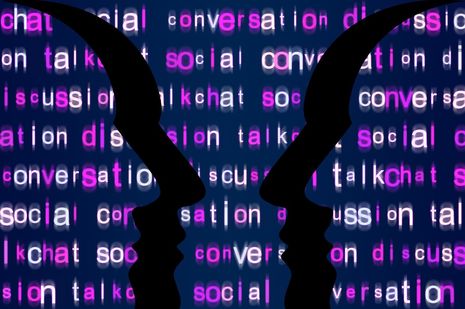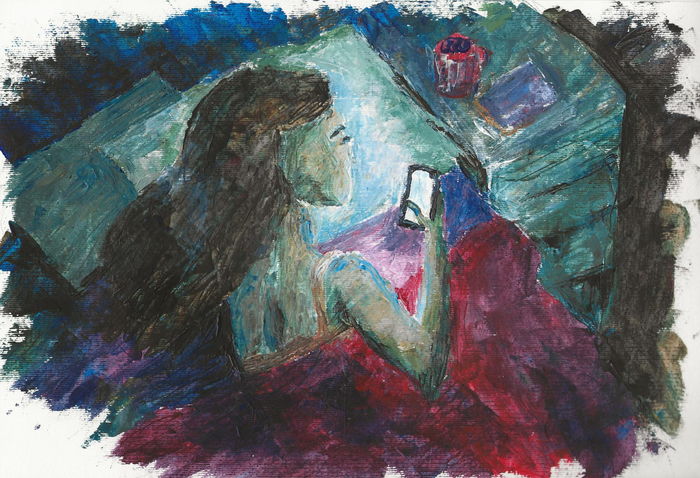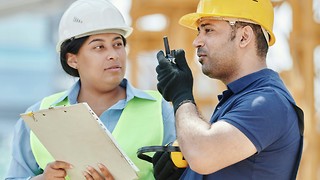Conversations with ends: how lockdown has changed the way we talk to each other
Anna Rainbird-Chill explores the power of silence, and how lockdown has changed the way we communicate in meaningful ways

Walking down my road with my brother two weeks ago, I realised we had gone at least five minutes without saying a word to each other. This was not out of the ordinary. The men in my family have a well-established ability to say nothing for long stretches, or – my personal favourite – to only reply to what you said a full two minutes later, as if they’d only just heard it. I often walk on the street alongside my brother for several minutes, not talking. I cannot imagine doing the same for even one minute with my mum, who, throughout our childhoods, constantly narrated the world to me and my brother, as we sat on the bus, in the back of the car or on the walk to school, telling us about the landmarks, or plants in people’s gardens we were passing, about what we were going to do when we got to wherever we were going. Clearly, everyone has a different capacity for silence. Maybe it’s because we were raised by someone so constantly conversing that we now appreciate the need for pause; maybe we’re just secure in the knowledge that what’s holding us together is not regular conversation but a lifetime of kicking each other under the dinner table. Either way, it’s always something I notice when I’m home.
“I’ve had countless inconsequential conversations in my life, but I’m not sure I’ve ever had a completely meaningless silence”
Tolerating silence is often about context. Is it a date? A friend? Are you sitting or walking or cooking or on the tube? All of these inflect the conversation’s flow and pace in distinct ways. I always used to love that murky period of time at childhood sleepovers, when the conversation slowly faded as one of us fell asleep, as each word grew further apart and eventually the talk came to a halt. It’s more than situational, though: it comes down to our individual understanding of what silence is. Is it simply a denial of sound which conversation is shaped around? Or is it constructive, where what we’re saying can rest, be considered, and go on to generate new avenues? Most of the time it’s not just a dead pause but useful space, containing what we can’t acknowledge or articulate. Crucially, it moderates the conversation — everyone knows that desperately avoiding a silence, or even the whisper of the possibility of one, involves speaking faster. We all have distinct ways of not talking about what we don’t want to talk about, of not saying what we do want to say, but strangely silence is not necessary for either. With my brother, the absence of talking is an acknowledgement that, in that moment, nothing needs to be added. More than anything, it’s affirming. All of this means I’ve had countless inconsequential conversations in my life, but I’m not sure I’ve ever had a completely meaningless silence.
Along with everything else, the pandemic has changed our relationship to silence. For a year, the default way of interaction has been through a medium that doesn’t really tolerate silence at all: screens. Over the weekly FaceTime calls with my friends in the first lockdown, it quickly became clear how the mechanisms of conversation had changed. The inability of most video chat apps to withstand multiple people talking at the same time both concentrates and painfully streamlines the conversation; the lack of the physical presence of other people strips the interaction down solely to conversation. This increased necessity to speak soon began to conflict with the increasing lack of things we actually had to say — denied the real-life friends, dates and events that normally would have provided news. In grinding things to a halt, Covid showed us how exhaustive our source of conversation could be. Surely silence was inevitable. And yet, weirdly, it wasn’t. Because it turns out that that capacity for silence still has its socially acceptable limit which we are reluctant to cross.
“I’ve heard a lot about the ‘death of small talk’ during this time, but it seems like big talk is being compromised too”
A year on from the first lockdown and my friends and I are starting to wonder the extent to which this time has changed us, and how long those changes will last. At what point do our short-term adjusted responses to this experience start to cement into long-term habits and, eventually, personality? We would always have changed as people during any given year. But with such an unprecedented situation, how have we been changed outside of that period of time and objective life experience, in dealing with things no one was expected to?
One of the biggest ways I’ve noticed this manifest is in these digital conversations I continue to have, which seem to be shifting away from actually conversing and more towards monologuing at other people. It’s the shift from talking ‘to’ and ‘with’ to ‘at’. The pressure to constantly mine your own life for anecdotes even as we are limited in the freedom and context to create them means that, more and more, I’m afraid of being perceived as, and becoming, completely self-absorbed. I’ve heard a lot about the ‘death of small talk’ during this time, but it seems like big talk is being compromised too. And if Covid made our experience of the world shrink to our respective sets of four-walls, I’d hate for it to shrink my ability to converse to the limits of myself.
 Features / The community Cambridge accommodation creates (and doesn’t)9 August 2025
Features / The community Cambridge accommodation creates (and doesn’t)9 August 2025 News / Trinity sells O2 Arena lease for £90m12 August 2025
News / Trinity sells O2 Arena lease for £90m12 August 2025 Lifestyle / An ode to college accommodation11 August 2025
Lifestyle / An ode to college accommodation11 August 2025 Sport / ‘A full-time job with overtime’: should disparities change the way we approach Bumps?6 August 2025
Sport / ‘A full-time job with overtime’: should disparities change the way we approach Bumps?6 August 2025 Features / Incoming freshers and their hopes, fears and expectations for Cambridge 12 August 2025
Features / Incoming freshers and their hopes, fears and expectations for Cambridge 12 August 2025










